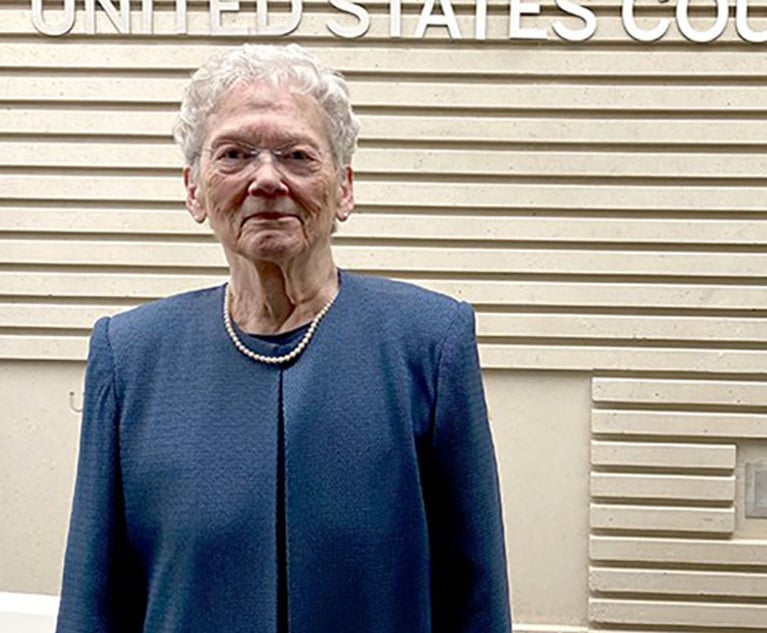Plaintiffs Lawyers Fight to Keep $4.7B Talc Verdict, Citing J&J's 'Perfect Storm' of Misconduct
Johnson & Johnson has filed motions to toss the verdict, accusing the plaintiffs' lawyer, Mark Lanier, of referencing stillborn babies in his opening statement and showing a drawing of a woman pushed over a ledge into ovarian cancer.
November 02, 2018 at 11:10 AM
5 minute read
The original version of this story was published on Law.com
 An image used by plaintiffs counsel alleging J&J's talcum powder led to ovarian cancer. J&J said the image “served one purpose only: to inflame the jury.”
An image used by plaintiffs counsel alleging J&J's talcum powder led to ovarian cancer. J&J said the image “served one purpose only: to inflame the jury.”
Johnson & Johnson's refusal to warn consumers its baby powder might cause ovarian cancer, despite four decades of knowing about the risk, created a “perfect storm of highly reprehensible conduct” that warranted a $4.7 billion verdict in Missouri.
That's according to the plaintiffs' attorneys, who filed court documents Wednesday seeking to uphold the July 13 award, the largest verdict over talcum powder. Eric Holland, partner at Holland Law Firm in St. Louis, noted in his opposition to a motion for new trial on damages that while rare, “all factors support a large punitive damage award.”
“Defendants knew there was asbestos in what they marketed as 'baby' powder, but they deliberately targeted mothers and women in general with advertising misrepresenting the safety of their talc product,” Holland wrote.
Johnson & Johnson has moved to toss the award, calling it unconstitutional and excessive. It also alleges misconduct against the plaintiffs' lead trial counsel, Mark Lanier. Among other things, the company claims Lanier referenced stillborn babies in his opening statement, changed words on his website in midtrial and showed the jury a drawing of a woman pushed over a ledge into ovarian cancer by Johnson & Johnson's asbestos-containing baby powder.
“It is hard to conjure a more emblematic example of inflammatory and prejudicial statements at trial than statements about dead babies,” wrote Johnson & Johnson attorney Beth Bauer, a partner at HeplerBroom in Edwardsville, Illinois, in a Sept. 20 motion for a new trial. “The image of defendants pushing a woman off a cliff served one purpose only: to inflame the jury.”
Bauer was joined in the motions by Orrick, Herrington & Sutcliffe and Shook, Hardy & Bacon. Johnson & Johnson also filed a motion for a new trial on damages and a motion for a judgment notwithstanding the verdict.
It's not the first time Johnson & Johnson has gone head-to-head against Lanier. In April, the U.S. Court of Appeals for the Fifth Circuit reversed a $502 million hip implant award against its subsidiary, DePuy Orthopaedics, in part due to Lanier's “unequivocally deceptive” conduct.
“Such deceptive tactics have no place in a courtroom and further warrant new trials of each plaintiff family's claims,” Bauer wrote.
Lanier, in the plaintiffs' responses on Wednesday, acknowledged he mistakenly referred to stillborn babies in his opening statement but did so only in reference to a study, not to allude that Johnson & Johnson's baby powder caused their deaths. The plaintiffs' lawyers also defended the drawing, over which Johnson & Johnson never objected during trial.
“Such attacks are typical for these defendants, and they have launched them repeatedly in the media against both the court and the jury,” Holland wrote in opposing a motion for a new trial, joined by The Lanier Law Firm and Gray Ritter & Graham in St. Louis. “Defendants' repetitive and vindictive ad hominem attacks on Mr. Lanier are a PR stunt and do not advance the litigation. Litigants who lose and disapprove of opposing counsel's trial tactics are not for that reason entitled to a new trial.”
A St. Louis jury awarded $550 million in compensatory damages and $4.05 billion in punitive damages. The trial was the first talcum powder case for Lanier and the first ovarian cancer award in a case alleging Johnson & Johnson's talcum powder contained asbestos, a known carcinogen.
Johnson & Johnson's posttrial motions argued that the plaintiffs' attorneys failed to provide sufficient evidence that its baby powder caused ovarian cancer or that it caused the disease in each individual plaintiff. They criticized the testimonies of the plaintiffs' experts and said the plaintiffs' attorneys misconstrued Missouri's law on causation, an allegation opposed on Wednesday.
In its motion for a new trial on damages, Johnson & Johnson suggested that the compensatory damages be no more than $3 million per plaintiff. The company also challenged the use of a coordinated trial of 22 women because it was “inherently unfair” and “highly prejudicial,” an approach borrowed from its arguments in the hip implant verdicts.
Six plaintiffs died from ovarian cancer, several had spouses with additional claims, and each differed in their talcum powder use and prognoses.
“The proof is in the results: After five hours of jury instructions, the jury deliberated for only eight hours—less than 20 minutes per plaintiff,” Bauer wrote in the new trial motion. “Each family received the same $25 million in total compensatory damages, without any apparent regard for the individual circumstances of any particular plaintiff. The excessive and unconstitutional $4.14 billion punitive damage award highlights the combined effect of these rulings. Simply put: The trial was not fair, and the court should grant new trials for each individual plaintiff family.”
In responding, the plaintiffs' lawyers turned to the U.S. Court of Appeals for the Eleventh Circuit's 2017 ruling upholding a $27 million verdict in a consolidated trial of four women against Boston Scientific Corp. over its pelvic mesh products.
The $4.7 billion verdict came in the first talcum powder trial since the U.S. Supreme Court's decision in Bristol-Myers Squibb v. Superior Court of California, which made it harder for nonresident litigants to pursue claims in lawsuits with multiple plaintiffs.
In its motion for a judgment notwithstanding the verdict, Johnson & Johnson, based in New Jersey, continued to cite Bristol-Myers, noting that 17 of the 22 plaintiffs were not from Missouri. The plaintiffs' attorneys wrote on Wednesday that a Missouri talc supplier had established jurisdiction.
This content has been archived. It is available through our partners, LexisNexis® and Bloomberg Law.
To view this content, please continue to their sites.
Not a Lexis Subscriber?
Subscribe Now
Not a Bloomberg Law Subscriber?
Subscribe Now
NOT FOR REPRINT
© 2024 ALM Global, LLC, All Rights Reserved. Request academic re-use from www.copyright.com. All other uses, submit a request to [email protected]. For more information visit Asset & Logo Licensing.
You Might Like
View All

Middle District of Pennsylvania's U.S. Attorney Announces Resignation
2 minute read

Trending Stories
Who Got The Work
Michael G. Bongiorno, Andrew Scott Dulberg and Elizabeth E. Driscoll from Wilmer Cutler Pickering Hale and Dorr have stepped in to represent Symbotic Inc., an A.I.-enabled technology platform that focuses on increasing supply chain efficiency, and other defendants in a pending shareholder derivative lawsuit. The case, filed Oct. 2 in Massachusetts District Court by the Brown Law Firm on behalf of Stephen Austen, accuses certain officers and directors of misleading investors in regard to Symbotic's potential for margin growth by failing to disclose that the company was not equipped to timely deploy its systems or manage expenses through project delays. The case, assigned to U.S. District Judge Nathaniel M. Gorton, is 1:24-cv-12522, Austen v. Cohen et al.
Who Got The Work
Edmund Polubinski and Marie Killmond of Davis Polk & Wardwell have entered appearances for data platform software development company MongoDB and other defendants in a pending shareholder derivative lawsuit. The action, filed Oct. 7 in New York Southern District Court by the Brown Law Firm, accuses the company's directors and/or officers of falsely expressing confidence in the company’s restructuring of its sales incentive plan and downplaying the severity of decreases in its upfront commitments. The case is 1:24-cv-07594, Roy v. Ittycheria et al.
Who Got The Work
Amy O. Bruchs and Kurt F. Ellison of Michael Best & Friedrich have entered appearances for Epic Systems Corp. in a pending employment discrimination lawsuit. The suit was filed Sept. 7 in Wisconsin Western District Court by Levine Eisberner LLC and Siri & Glimstad on behalf of a project manager who claims that he was wrongfully terminated after applying for a religious exemption to the defendant's COVID-19 vaccine mandate. The case, assigned to U.S. Magistrate Judge Anita Marie Boor, is 3:24-cv-00630, Secker, Nathan v. Epic Systems Corporation.
Who Got The Work
David X. Sullivan, Thomas J. Finn and Gregory A. Hall from McCarter & English have entered appearances for Sunrun Installation Services in a pending civil rights lawsuit. The complaint was filed Sept. 4 in Connecticut District Court by attorney Robert M. Berke on behalf of former employee George Edward Steins, who was arrested and charged with employing an unregistered home improvement salesperson. The complaint alleges that had Sunrun informed the Connecticut Department of Consumer Protection that the plaintiff's employment had ended in 2017 and that he no longer held Sunrun's home improvement contractor license, he would not have been hit with charges, which were dismissed in May 2024. The case, assigned to U.S. District Judge Jeffrey A. Meyer, is 3:24-cv-01423, Steins v. Sunrun, Inc. et al.
Who Got The Work
Greenberg Traurig shareholder Joshua L. Raskin has entered an appearance for boohoo.com UK Ltd. in a pending patent infringement lawsuit. The suit, filed Sept. 3 in Texas Eastern District Court by Rozier Hardt McDonough on behalf of Alto Dynamics, asserts five patents related to an online shopping platform. The case, assigned to U.S. District Judge Rodney Gilstrap, is 2:24-cv-00719, Alto Dynamics, LLC v. boohoo.com UK Limited.
Featured Firms
Law Offices of Gary Martin Hays & Associates, P.C.
(470) 294-1674
Law Offices of Mark E. Salomone
(857) 444-6468
Smith & Hassler
(713) 739-1250





